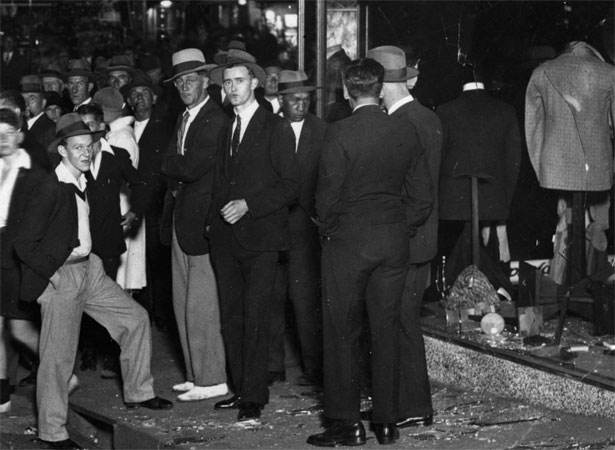
Auckland’s Queen Street riot was by far the most destructive of the disturbances that rocked the four main centres in the ‘angry autumn’ of 1932. Trouble first flared in Dunedin in January and again in April.
Worse soon followed in Auckland on 14 April, when a large crowd of unemployed relief workers joined Post and Telegraph Association members marching to a Town Hall meeting, swelling their numbers to around 15,000. Angry at being turned away from the overflowing hall, some demonstrators scuffled with policemen barring their entrance. When a leader of the unemployed, Jim Edwards, rose to speak – apparently to urge calm – a policeman struck him down. The crowd erupted and surged down Queen St. Armed with fence palings and stones taken from a mini-golf course in Civic Square, they smashed hundreds of shop windows and looted jewellery, liquor, clothing and tobacco.
One chemist shop was cleaned out of contraceptives. A man was seen staggering off with a grandfather clock on his back, and the department store Milne & Choyce ‘grieved over the spoliation of their very costly wax “dummies”’.
Reinforced by armed navy sailors and volunteers, the police regained control of the central city several hours later. Hundreds of people were injured, including several policemen, while 35 were arrested for looting. Ninety-eight Waikato Territorial Army troops and a thousand volunteer (‘special’) police constables bolstered government forces the next day, but violence flared again that night. As crowds massed in Karangahape Rd, scuffles broke out and more windows were smashed. By the end of the night, there had been another 50 injuries and 35 more arrests.
Auckland’s riots were followed by further disturbances in Christchurch and Wellington in early May. A state of siege settled on the main centres, with ‘specials’ patrolling the streets, all outdoor meetings banned and shop windows boarded up for weeks, but there was no more major trouble.
Read more on NZHistory
Queen Street riot 1984 – New Zealand Music MonthOrigins – The New Zealand Legion
External links
How to cite this page
'Unemployed riot rocks Queen Street', URL: https://nzhistory.govt.nz/queen-st-riot-auckland, (Ministry for Culture and Heritage), updated 8-Oct-2021
